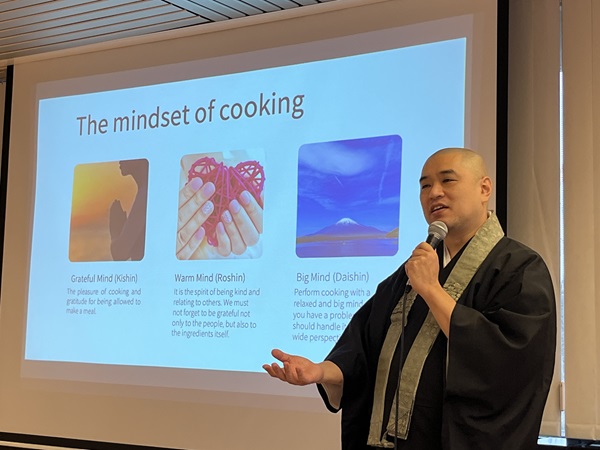 Credit: Chronicle.lu
Credit: Chronicle.lu
On Sunday 14 January 2023, the Centre Culturel Cents hosted a Shojin Ryori Buddhist Cuisine Presentation for around 70 people by Japanese monk Kakuho Aoe.
Organised by the Embassy of Japan in Luxembourg, registration for the event had proved so popular that a second presentation had been organised earlier in the day.
The Japanese Ambassador to Luxembourg, Tadahiro Matsubara, referenced the popularity of the event, the first of its kind in Luxembourg. He explained that Kakuuo Aoe earned an MBA in the US and has written books on Buddhist Cuisine and has appeared on television cooking programmes too. He mentioned that there are many Japanese restaurants in Luxembourg but none serve original Buddhist cuisine.
Kakuho Aoe's presentation (in English) addressed the philosophy, history and preparation of Buddhist Cuisine. Shojin Ryori is a traditional Buddhist vegetarian cuisine handed down in Japanese temples for generations. It combines the concepts of food diversity, using every part including leftovers, and health-conscious recipes.
This "temple cuisine" is free from meat and fish but it is also so much more; the presentation covered how to cook, how to eat, etc. Apart from not eating meat and fish, some temples do not use milk and cheese, onions, garlic, leeks, chives and shallots. The monks' training is about reducing greed, thus the reasoning behind not eating foods that produce energy.
How to cook
He explained that it may be comparable to veganism; but it is more of a mindset, mentioning Grateful Mindset (Kishin), Warm Mind (Roshin) and Big Mind (Daishin). He also addressed seasoning, explaining that Shojin cuisine also uses Tang (in addition to sweet, spicy, sour, etc.). He referenced the three virtues: Kyonan (making ingredients easy to eat), Joketsu (clean and refreshing) and Nyohosa (cooking carefully, in the correct order); also the five methods / five colours raw, boil, bake, steam, deep fry / red, yellow, blue/green, black and white.
How to eat
He started by explaining that Japanese people have been saying "i tadakimasu" before eating for more than a hundred years, originating from when school lunches were served. In temples, they have been saying a short prayer before meals for more than a thousand years: in this context, he talked about imagining where the food come from and that food, when eaten, is now a part of one's body.
Afterwards
He explained that Shojin Cuisine is now attracting attention from abroad: eliminating leftovers, food diversity and health consciousness.
After the presentation, participants could taste the two presented dishes, prepared by the chef for the Japanese Ambassador, Tomohisa Mitsuhashi, namely Hiryuzu (deep fried tofu) and Makie Pudding (Sesame Soy Milk Pudding).
Participants were provided with copies of the recipes, as well as magazines and information on the topic, and Japanese culture in general.
On Monday 15 January 2024, Kakuho Aoe is set to visit the École d'Hôtellerie et de Tourisme du Luxembourg in Diekirch to make a similar presentation there, in addition to a practical cookery demonstration.









